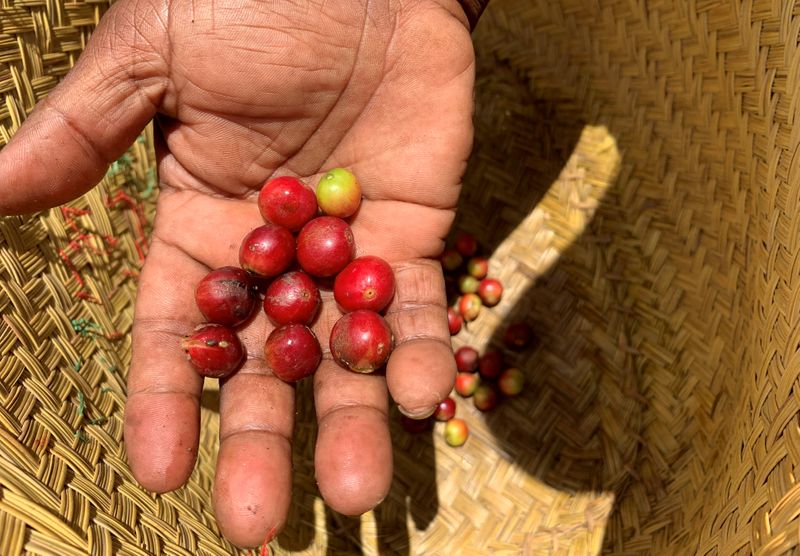By Anna Bellissens
ITASY, Madagascar (Reuters) - In the rich volcanic soils of central Madagascar’s Itasy province grows a rare and fragrant coffee coveted by bats and humans alike. The twist: humans want it even more after the bats have nibbled on it.
Bat spit gives the beans a uniquely smooth flavour, say consumers, sending demand for an already expensive speciality bourbon pointu coffee soaring to nearly $110 per pound (220 euros/kg).
Farmers around the world are turning to premium and rare beans, some including an animal touch, to shore up their incomes amid a global production glut that has driven down prices.
But this may be the first time such coffee is being commercially produced in Africa, said Matthew Harrison, buyer at speciality coffee sourcing company Trabocca.
Madagascar used to produce mainly lower-quality robusta beans used in instant coffees, but now farmers like Nirina Malala Ravaonasolo are producing bourbon pointu beans, a premium variety of higher-priced arabica coffee.
"Before, most people here in Itasy did not have any interest in growing coffee," said Ravaonasolo, president of a local coffee group. "Today it's become our livelihood."
Bourbon pointu sells domestically for about $101 per pound (200 euros/kg), more than 50 times the price of commodity-grade coffee. A bit of bat spit pushes the price higher.
Wild bats chewing on ripe coffee berries results in a reaction between their digestive fluids and outside air that gives a uniquely smooth flavour, say customers.
"It’s very special," said Ronald Van der Vaeken, a local Belgian hotelier. "Normal coffee, after two minutes, you forget the taste - but this coffee stays a very long time in your mouth. It's not acidic… it’s very good."
It's the brainchild of farmer and agricultural entrepreneur Jacques Ramarlah.
Two years ago, he reintroduced bourbon pointu beans to the area from nearby Reunion Island. He later introduced bat coffee after observing them nibbling the best beans.
Now, Ramarlah works with about 90 farmers who send him beans for processing and marketing, some at his on-farm restaurant.
The farmers produced two tonnes of coffee this year, with plans for 20 tonnes by 2021, for export to discerning markets like Japan. His customers mostly come from local high-end restaurants and hotels. Bat coffee will be a small portion of production.
Madagascar's animal-enhanced coffee is not unique — Southeast Asia’s Kopi Luwak coffee is made from beans salvaged from civet cat poop; Thailand has elephant dung coffee; and there's a Costa Rican bat coffee similar to Ramarlah’s.
Extremely high-value coffee is a very niche market, but it is growing, said Harrison, the Trabocca buyer.

The global speciality coffee market is forecast to hit $83.6 billion in 2025, said Adroit Market Research, more than doubling its 2018 market size.
(Additional reporting and writing by Ayenat Mersie; editing by Katharine Houreld and Katya Golubkova)